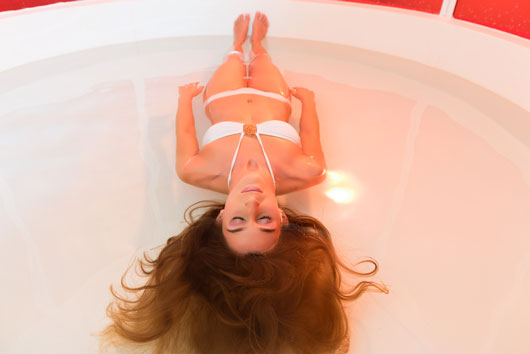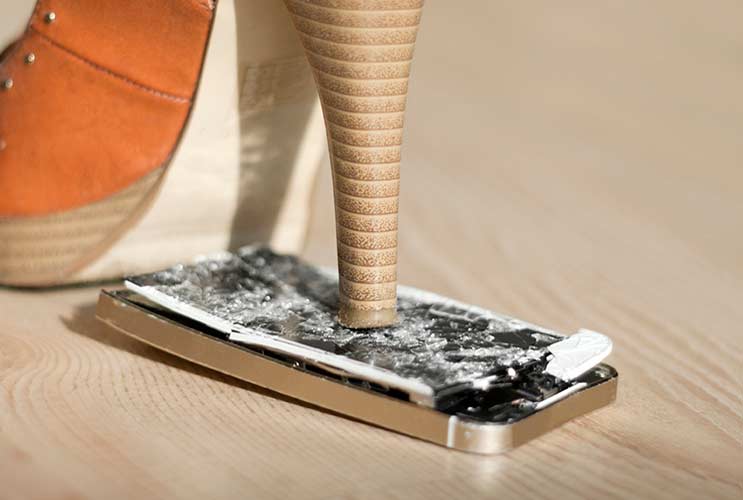
If the word “deprivation” typically makes you want to run away as fast as you can, then you probably don’t know much about the phenomenon of a sensory deprivation tank. Sure, it doesn’t exactly sound like fun—any experience that promises to deprive us of something sounds a little scary, to say the least. But this form of therapy, often called floatation therapy, is getting a lot of buzz, and for a lot of good reasons. So what is it, exactly? This therapy entails you spending time in an isolation tank, which is filled with a small amount of salty room-temperature water, an exercise meant to induce the feeling of floating. Picture a tank that mimics the effects of the Dead Sea.
As the Washington Post reports, according to Anette Kjellgren, a psychology professor who has studied flotation at Karlstad University in Sweden since the 1990s, “floating can help with a laundry list of conditions, including stress, muscular pain, addiction, fibromyalgia and disorders associated with whiplash. The technique can also facilitate traditional psychotherapy and even help address ADHD and autism spectrum disorders.” Here are 8 reasons people want to experience a sensory deprivation tank; read on and then decide if an isolation tank just might be right for you.
Read Related: Vipassana Meditation: Why Ten Days of Silence Will Calm any Latina

1. It Can Help You Relax
If you’ve ever had a really great night of sleep and wake up the next morning feeling relaxed and fresh, then you’ve experienced the kind of restoration you can experience with sensory deprivation therapy. Experts believe that “time in the tank may induce a neurological state similar to sleep, dialing down the sympathetic nervous system—the part of our brains associated with fight or flight—while turning up the parasympathetic nervous system, associated with rest.” If a nap isn’t in the cards and you have trouble winding down at the end of the day, floatation therapy might be for you.

2. It Can Reduce Inflammation and Flush Toxins From the Body
The combination of floating (in a small amount of water) mixed with the high concentration of Epsom Salt in the water results in amazing benefits for your muscles, your skin, your immune system and beyond. This is because the act of floating improves blood circulation, and improved cardiovascular activity also improves your immune system and your body’s ability to heal. In addition, your skin will look younger and you will glow inside and out.
3. Your Creative Juices Will Flow
If you’ve ever had a great idea in the shower then you know that sometimes being in a relaxed state can help improve creativity and innovation. Similarly, time in a deprivation tank can help you disconnect from all the distractions in your life, and help you unwind so that you are able to come up with more creative ideas. While evidence to support this fact is hard to come by, “a study with 40 university students, a single hour of flotation increased their scores on a standardized test used to measure creativity.” So if you ever feel like you’re in a rut, floatation therapy might be worth a shot.

4. You will Actually Feel Weightless
By laying in a small amount of water—only about 10 inches deep—which is kept at the temperature of your skin you will experience a sensation of being weightless. In addition, the massive amount of Epson Salt put into the water (about 1000 pounds) will make your body extremely buoyant, so you will feel like you are floating.
5. Your Senses will be Enhanced (But you Might Hallucinate)
Perhaps it’s from the isolation—when you’re in the tank there is no light, no noise and no distractions—or maybe it’s because of the time left alone only with your thoughts, but during floatation therapy your senses are heightened, to the point where you might even start to hallucinate. When you are not surrounded by external stimuli your brain starts to create things that don’t really exist (think sounds, lights etc.) You might start to hear music that isn’t actually playing or hear the sound of the ocean, even though it’s totally silent. When you finish your therapy, your heightened senses will only increase. People who have experienced floatation therapy claim that colors will look brighter and food will taste better.

6. Your Muscles Will Feel Better During and After Therapy
There’s a reason that athletes and entire sports teams are devoted to regular floatation therapy as a part of their training. Sensory deprivation therapy can ease muscle pain, help the body heal, improve blood flow and allow inflamed muscles to relax—all of which are important parts of the healing process after a tough workout or any strenuous activity.
7. It Can Lower Your Blood Pressure and Reduce Stress
At any given moment during your day you have stress and adrenalin pumping through your body; if you want to reduce those levels of stress then you need to not only make a conscious effort to relax, but you also need to manage the levels of serotonin and magnesium in your blood. Floating in Epson Salt can increase serotonin (which elevates your mood) and can help increase circulation, which can reduce blood pressure. The result is a healthy sense of calm.
8. The Lasting Effects Are Similar to Meditation
It’s no secret that meditation can provide a lasting sense of calm and an ability to appreciate the moment and focus more on balancing your body and mind. Similarly, the intense isolation of sensory deprivation therapy provides another way to focus on mindfulness and improve your mind-body connection in a short period of time. According to therapist and mindfulness expert Adrienne Glasser, the most crucial part of floatation therapy is that you practice regularly and you seem a way to unplug, unwind and focus on yourself. “It is just taking a pause in your day to day…” that can make a difference, she explains.











